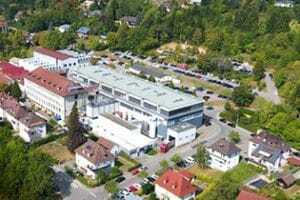정보 보호
참고: 이 텍스트는 독일어 버전에서 번역되었습니다. 독일어 버전이 법적으로 유효한 유일한 버전입니다.
개인 데이터 수집 및 처리 책임자
기본 용어
개인 데이터 처리 원칙
개인 데이터 수집 및 처리의 일반적인 특성
데이터 주체의 권리
개인 데이터 사용
애플리케이션
분석 도구 및 마케팅
개인 데이터와 관련하여 회사와 제3자와의 상호 작용
제3국으로의 개인 데이터 전송
개인 데이터 보호를 위한 보안 조치
미성년자 보호
개인정보 처리방침을 업데이트할 권리
Gühring KG는 고객에게 독특하고 안전한 온라인 경험을 제공하기 위해 노력합니다. 데이터 보호는 모든 Gühring KG 직원에게 최우선 과제입니다. 원칙적으로 개인 정보를 제공하지 않고도 Gühring KG 웹사이트를 이용할 수 있습니다. 그러나 정보 주체가 웹사이트 또는 온라인 상점을 통해 Gühring KG가 제공하는 특정 서비스를 이용하고자 하는 경우 개인 데이터를 처리해야 할 수 있습니다. 개인 데이터 처리가 필요하고 그러한 처리에 대한 법적 근거가 없는 경우, Gühring KG는 일반적으로 데이터 주체의 동의를 얻습니다.
이 정책은 GDPR, 연방 데이터 보호법 및 데이터 보호에 관한 독일 연방 공화국 및 유럽연합의 기타 법적 조항에 따라 작성되었습니다. 이 개인정보 처리방침을 통해 Gühring KG는 개인 데이터의 수집, 사용 및 처리의 유형, 범위 및 목적에 대해 대중에게 알립니다. 또한 관련자에게 본 개인정보 보호 지침에 따라 자신의 권리에 대해 알려드립니다.
개인 데이터 수집 및 처리 책임자
일반 데이터 보호 규정, 유럽연합 회원국에서 적용되는 기타 데이터 보호법 및 데이터 보호 성격의 기타 조항의 의미 내에서 컨트롤러는 회원님이 됩니다:
Gühring KG
헤르더슈트라세 50-54
72458 알브슈타트
독일
전화: +49 (0) 7431 17-0
이메일: info@guehring.de
웹사이트: https://guehring.com/
데이터 주체는 데이터 보호에 관한 질문이나 제안이 있는 경우 언제든지 데이터 보호 담당자에게 직접 문의할 수 있습니다:
Gühring KG, 데이터 보호 책임자
헤르더슈트라세 50-54
72458 알브슈타트
독일
전화: +49 (0) 7431 17-0
이메일: datenschutz@guehring.de
웹사이트: https://guehring.com/
기본 용어
a) 개인 데이터
개인정보란 식별되거나 식별 가능한 자연인(이하 “정보주체”라 함)과 관련된 모든 정보를 의미합니다. 식별 가능한 자연인은 특히 이름, 식별 번호, 위치 데이터, 온라인 식별자와 같은 식별자 또는 해당 자연인의 신체적, 생리적, 유전적, 정신적, 경제적, 문화적 또는 사회적 정체성에 특정한 하나 이상의 요소를 참조하여 직접 또는 간접적으로 식별할 수 있는 자연인을 말합니다.
b) 데이터 주체
데이터 주체란 개인정보 처리를 담당하는 관리자가 개인 데이터를 처리하는 식별되거나 식별 가능한 모든 자연인을 말합니다.
c) 처리
처리란 수집, 기록, 조직, 구조화, 저장, 조정 또는 변경, 검색, 상담, 사용, 전송, 배포 또는 그 밖의 방법으로 공개, 정렬 또는 조합, 제한, 삭제 또는 파기 등 자동화된 수단에 의한 것인지 여부에 관계없이 개인 데이터 또는 개인 데이터 집합에 대해 수행되는 모든 작업 또는 일련의 작업을 의미합니다.
d) 처리 제한
처리 제한은 향후 처리를 제한하기 위해 저장된 개인 데이터에 표시를 하는 것입니다.
e) 프로파일링
프로파일링은 개인 데이터를 사용하여 자연인과 관련된 특정 개인적 측면, 특히 해당 자연인의 업무 성과, 경제적 상황, 건강, 개인 취향, 관심사, 신뢰도, 행동, 위치 또는 움직임과 관련된 측면을 분석하거나 예측하기 위해 개인 데이터를 사용하는 모든 형태의 자동화된 개인 데이터 처리입니다.
f) 가명 처리
가명 처리란 추가 정보를 사용하지 않고는 더 이상 특정 정보주체에게 개인 데이터를 귀속시킬 수 없는 방식으로 개인 데이터를 처리하는 것으로, 이러한 추가 정보가 별도로 보관되고 개인 데이터가 식별되거나 식별 가능한 자연인에게 귀속되지 않도록 기술적 및 조직적 조치를 취하는 것을 전제로 합니다.
g) 처리 책임자 또는 컨트롤러
처리 책임자 또는 컨트롤러는 단독으로 또는 다른 사람과 공동으로 개인 데이터 처리의 목적과 수단을 결정하는 자연인 또는 법인, 공공 기관, 기관 또는 기타 단체를 의미합니다. 이러한 처리의 목적과 수단이 유럽연합 또는 회원국 법률에 의해 결정되는 경우, 컨트롤러 또는 그 지정을 위한 구체적인 기준은 유럽연합 또는 회원국 법률에 의해 제공될 수 있습니다.
h) 프로세서
처리자는 컨트롤러를 대신하여 개인 데이터를 처리하는 자연인 또는 법인, 공공 기관, 대행사 또는 기타 기관입니다.
i) 수신자
수신자는 제3자 여부에 관계없이 개인 데이터가 공개되는 자연인 또는 법인, 공공 기관, 대행사 또는 기타 단체를 의미합니다. 단, 유럽연합 또는 회원국 법률에 따라 특정 문의의 틀 안에서 개인 데이터를 수신할 수 있는 공공 기관은 수신자로 간주되지 않습니다.
j) 타사
제3자란 데이터 주체, 컨트롤러, 처리자 및 컨트롤러 또는 처리자의 직접적인 권한 하에 개인 데이터를 처리할 권한이 있는 사람 이외의 자연인 또는 법인, 공공 기관, 기관 또는 단체를 말합니다.
k) 동의
동의는 정보 주체가 진술 또는 명확한 긍정적 조치를 통해 자신과 관련된 개인 데이터 처리에 동의한다는 것을 의미하는 정보 주체의 의사를 자유롭고, 구체적이고, 충분한 정보를 바탕으로 명확하게 표시하는 것을 말합니다.
개인 데이터 처리 원칙
개인 데이터 처리는 합법적이고 공정한 기준에 따라 수행됩니다.
개인 데이터의 처리는 구체적이고 미리 정해진 합법적인 목적으로만 제한됩니다. 데이터 수집 목적에 부합하지 않는 개인 데이터의 처리는 허용되지 않습니다.
개인 데이터가 포함되어 있고 호환되지 않는 목적으로 처리되는 데이터베이스를 연결하는 것은 허용되지 않습니다.
처리 목적에 적합한 개인 데이터만 처리됩니다.
개인정보 처리자는 개인 데이터를 처리할 때 정확하고, 충분히 최신 상태이며, 필요한 경우 처리 목적과 관련하여 최신 상태인지 확인해야 합니다. 관리자는 필요한 조치를 취하거나 불완전하거나 부정확한 데이터를 삭제 또는 수정해야 합니다.
개인 데이터는 연방법, 계약 또는 수혜자 또는 보증인 당사자에 의해 보존 기간이 규정되어 있지 않는 한, 개인 데이터 처리 목적에 필요한 기간보다 더 이상 해당 개인 참조를 확인할 수 있는 형태로 저장되지 않습니다. 처리된 개인 데이터는 연방법에서 규정하지 않는 한 처리 목적이 달성되거나 이러한 목적 달성의 필요성이 더 이상 적용되지 않는 경우 즉시 삭제되거나 익명화됩니다.
개인 데이터 수집 및 처리의 일반적인 특성
처리의 법적 근거
컨트롤러 및/또는 운영자로서 개인 데이터를 처리하기 전에 Gühring KG는 처리의 법적 근거를 결정합니다.
6조 1항 a항은 회사가 특정 처리 목적에 대한 동의를 얻은 처리 작업의 법적 근거로서 Gühring KG에 적용됩니다. 예를 들어, 상품 공급 또는 기타 서비스 또는 대가의 제공에 필요한 처리 작업과 같이 데이터 주체가 당사자인 계약의 이행을 위해 개인 데이터 처리가 필요한 경우, 해당 처리는 GDPR 제6조 I항 b호에 근거합니다.
계약 전 조치의 이행에 필요한 처리 작업(예: Gühring KG의 제품 또는 서비스에 대한 문의)에도 동일하게 적용됩니다. 납세 의무 이행과 같이 개인 데이터를 처리해야 하는 법적 의무가 Gühring KG에 적용되는 경우, 해당 처리는 GDPR 제6조 I항 c호에 근거합니다.
드물지만 정보 주체 또는 다른 자연인의 중대한 이익을 보호하기 위해 개인 데이터 처리가 필요한 경우가 있을 수 있습니다. 예를 들어 Gühring KG 사업장 방문자가 부상을 당하여 이름, 나이, 건강 보험 정보 또는 기타 중요한 정보를 의사, 병원 또는 기타 제3자에게 전달해야 하는 경우가 이에 해당합니다. 이 경우 처리는 GDPR 제6조 I항 d호에 근거하여 이루어집니다.
궁극적으로 처리 작업은 GDPR 6조 1절 f항에 근거할 수 있습니다. 이 법적 근거는 개인정보 보호가 필요한 데이터 주체의 이익이나 기본적 권리 및 자유에 의해 그러한 이익이 우선하는 경우를 제외하고, Gühring KG 또는 제3자가 추구하는 정당한 이익을 위해 처리가 필요한 경우 위에서 언급한 법적 근거에 포함되지 않는 처리 작업에 사용됩니다. 특히 유럽 입법자가 구체적으로 언급했기 때문에 Gühring KG는 이러한 처리 작업을 수행할 수 있습니다. 이와 관련하여 데이터 주체가 컨트롤러의 고객인 경우 정당한 이익이 있다고 간주할 수 있다는 견해를 취했습니다(Recital 47 문장 2 GDPR).
또한 Gühring KG는 문의에 응답하거나 요청된 뉴스레터를 발송하는 등 다른 목적으로도 정보 주체의 정보를 사용합니다.
데이터 처리 목적
Gühring KG는 서비스 제공 또는 데이터 주체와의 법적 의무 및 계약 이행에 필요한 데이터 주체의 개인 데이터만 수집 및 저장합니다.
정보 주체의 개인 데이터는 다음과 같은 목적으로 처리될 수 있습니다:
-
- 웹사이트 등록(로그인), 웹사이트에 대한 액세스 및 그러한 행위와 관련된 기타 모든 경우의 제공
- 웹사이트 사용자에게 웹사이트의 개인화된 리소스에 대한 액세스 권한을 제공합니다
- 알림 전송, 웹사이트 사용에 대한 문의, 서비스 제공, 웹사이트 사용자의 문의 및 요청 처리 등 웹사이트 사용자와 피드백을 주고받기 위해 사용됩니다
- 웹사이트 사용자가 계정 생성에 동의한 경우 사용자 계정 생성
- 웹사이트 이용과 관련하여 문제가 발생할 경우 웹사이트 사용자에게 효과적인 고객 및 기술 지원을 제공합니다
- 웹사이트의 기능 및 보안 보장, 웹사이트 사용자의 행위 확인, 사기, 컴퓨터 바이러스 및 기타 악용 방지 및 그러한 사례 조사 등
- 구매 계약 체결 또는 서비스 제공을 위해 필요한 한도 내에서 데이터 처리. 구매와 관련된 특정 데이터의 처리는 데이터 주체가 이를 요청하거나 동의한 경우에만 이루어집니다
- 웹사이트 사용자가 다양한 채널을 통해 개인화된 정보 수신, 디바이스로 푸시 알림 전송, 디바이스에서 적절한 개인정보 설정, 쿠키 설정 동의 또는 프로모션 참여를 위한 법적 조건 수락에 동의하는 경우 등 동의에 기반한 마케팅 목적의 데이터 처리
데이터 처리의 설명 및 범위
Gühring KG는 다음을 포함하여 데이터 주체가 제공한 정보를 수집합니다:
-
- 제품 또는 서비스 주문을 처리하기 위해 정보 주체의 이름, 주소, 연락처, 배송 및 결제 정보를 수집합니다.
- 정보 주체가 Gühring KG의 고객 지원팀에 연락하면 적절한 답변을 제공하기 위해 신원 및 취급 중인 제품을 확인하기 위한 정보를 수집합니다.
- 데이터 주체가 Gühring KG의 서비스 담당자와 통신하는 경우, 메시지는 Gühring KG의 시스템 등을 통해 전달됩니다.
Gühring KG는 정보주체와 Gühring KG의 웹 플랫폼 사용, 정보주체와의 상호 작용, 정보주체가 웹사이트 또는 온라인 상점을 사용하는 데 사용하는 네트워크, 네트워크 장치 및 컴퓨터 또는 기타 장치에 대한 정보를 수집합니다. 기록할 수 있는 정보는 다음과 같습니다:
-
- 사용 중인 브라우저 유형 및 버전
- 액세스하는 시스템에서 사용하는 운영 체제입니다
- 액세스 시스템이 웹사이트 또는 온라인 상점에 대한 액세스를 수신하는 웹사이트입니다
- 웹사이트의 액세스 시스템을 통해 액세스할 수 있는 하위 웹사이트입니다
- 웹사이트에 액세스한 날짜와 시간
- 인터넷 프로토콜 주소(IP 주소)입니다
- 액세스 시스템의 인터넷 서비스 제공업체 및
- 정보 기술 시스템 등에 대한 공격 시 보안 목적으로 사용되는 기타 유사한 데이터 및 정보
개인정보는 일반적으로 두 가지 방식으로 수집됩니다: (1) 특정 통지 또는 이용 또는 등록 요청에 대한 응답으로 정보 주체가 웹사이트의 적절한 양식에 직접 입력하거나 기타 고의적이고 자발적으로 제공하는 정보(예: 이메일); (2) 정보 주체가 웹사이트 또는 온라인 상점을 이용할 때 자동으로 수집되는 정보.
이러한 일반 데이터 및 정보를 사용할 때 Gühring KG는 데이터 주체에 대한 어떠한 결론도 내리지 않습니다. 오히려 이러한 정보는 (1) 웹사이트의 콘텐츠를 정확하게 전달하고, (2) 웹사이트의 콘텐츠와 광고를 최적화하며, (3) 정보 기술 시스템과 웹사이트의 기술의 장기적인 기능을 보장하고, (4) 사이버 공격 발생 시 형사 기소에 필요한 정보를 법 집행 기관에 제공하기 위해 필요합니다. 따라서 Gühring KG는 기업의 데이터 보호 및 데이터 보안을 강화하고 Gühring KG에서 처리하는 개인 데이터에 대한 최적의 보호 수준을 보장하기 위해 익명으로 수집된 데이터와 정보를 통계적으로 분석합니다. 서버 로그 파일의 익명 데이터는 데이터 주체가 제공한 모든 개인 데이터와 별도로 저장됩니다.
개인 데이터가 저장되는 기간
Gühring KG는 Gühring KG가 데이터를 수집한 계약 또는 법적 의무를 이행하는 데 필요한 기간 동안만 개인 데이터를 저장합니다. 그 이후에도 민법에 따른 청구권의 법적 제한 기간 또는 법적 보존 의무와 관련하여 당사가 이를 준수해야 하는 경우가 아니라면, KG는 즉시 데이터를 삭제합니다.
Gühring KG는 보관 목적이 달성되는 즉시 정보 주체의 개인 데이터를 삭제하거나 차단합니다. 또한 Gühring KG는 독일 상법(HGB) 또는 독일 재정법(AO) 등에 따라 발생하는 다양한 보존 및 문서화 의무를 준수해야 합니다. 규정된 보존 및 문서화 기간은 최대 10년입니다. 또한 보존 기간은 법정 제척 기간에 따라 평가되며, 예를 들어 독일 민법(BGB) 195조 이하에 따라 최대 30년이 될 수 있으며, 일반 제척 기간은 3년입니다.
행정 또는 법원 소송과 관련하여 소위 법정 또는 사법 보존(소송 기간 동안 데이터 삭제 금지)이 명령된 경우와 같이 특정 상황에서 정보 주체의 데이터는 더 오랜 기간 동안 보존될 수도 있습니다.
데이터 주체의 권리
a) 확인할 권리
각 데이터 주체는 유럽 입법자가 컨트롤러로부터 자신과 관련된 개인 데이터가 처리되고 있는지 여부에 대한 확인을 받을 수 있는 권리를 부여받습니다. 데이터 주체가 이 확인 권리를 이용하고자 하는 경우 언제든지 Gühring KG의 직원에게 연락할 수 있습니다.
b) 정보에 대한 권리
유럽 입법자에 따르면 모든 데이터 주체는 컨트롤러로부터 자신에 대해 저장된 개인 데이터에 대한 정보와 이 정보의 사본을 언제든지 무료로 얻을 수 있는 권리가 있습니다.
c) 수정할 권리
각 데이터 주체는 자신과 관련된 부정확한 개인 데이터의 수정을 지체 없이 컨트롤러로부터 받을 수 있도록 유럽 입법자가 부여한 권리를 갖습니다. 처리 목적을 고려하여 데이터 주체는 보충 설명을 제공하는 등의 방법으로 불완전한 개인 데이터를 완성할 수 있는 권리를 갖습니다.
데이터 주체가 이러한 정정 권리를 행사하고자 하는 경우 언제든지 Gühring KG의 직원에게 연락할 수 있습니다.
d) 삭제할 권리(잊혀질 권리)
유럽 법률에 따라 모든 데이터 주체는 컨트롤러로부터 부당한 지체 없이 자신과 관련된 개인 데이터의 삭제를 요청할 권리가 있으며, 컨트롤러는 처리가 필요하지 않고 계속 처리해야 할 최우선적인 합법적 근거가 없는 경우 부당한 지체 없이 개인 데이터를 삭제할 의무를 갖습니다.
e) 처리 제한에 대한 권리
유럽 법률에 따라 모든 데이터 주체는 법률에 규정된 조건 중 하나가 충족되는 경우 컨트롤러로부터 처리 제한을 요청할 권리가 있습니다.
처리 제한에 대한 법적 근거가 있고 데이터 주체가 Gühring KG에 저장된 개인 데이터의 처리 제한을 요청하고자 하는 경우 언제든지 컨트롤러의 직원에게 연락할 수 있습니다.
Gühring KG의 직원이 처리 제한을 조정할 것입니다.
f) 데이터 이동성에 대한 권리
각 데이터 주체는 유럽 입법자가 컨트롤러에 제공한 자신에 관한 개인 데이터를 구조화되고 일반적으로 사용되며 기계 판독이 가능한 형식으로 수신할 수 있는 권리를 갖습니다. 정보주체는 개인정보 처리가 GDPR 제6조 제1항 (a)호 또는 GDPR 제9조 제2항 (a)호에 따른 동의 또는 GDPR 제6조 제1항 (b)호에 따른 계약에 근거하고, 처리가 공익을 위해 수행되는 업무의 수행 또는 컨트롤러에 부여된 공식 권한 행사에 필요하지 않은 한, 자동화된 수단으로 수행되는 한, 개인정보를 제공한 컨트롤러의 방해 없이 해당 데이터를 다른 컨트롤러로 전송할 권리를 갖습니다.
또한 GDPR 제20조 1항에 따라 데이터 주체는 기술적으로 가능하고 타인의 권리와 자유에 부정적인 영향을 미치지 않는 경우 개인정보를 한 컨트롤러에서 다른 컨트롤러로 직접 전송할 수 있는 권리를 갖습니다.
데이터 이동성에 대한 권리를 주장하기 위해 데이터 주체는 언제든지 Gühring KG의 모든 직원에게 연락할 수 있습니다.
g) 이의 제기 권리
각 정보 주체는 해당 조항에 근거한 프로파일링을 포함하여 GDPR 제6조(1)의 (e) 또는 (f)항에 근거한 자신에 관한 개인 데이터 처리에 대해 유럽 입법자가 부여한 권리를 근거로 언제든지 자신의 특정 상황과 관련된 이유로 이의를 제기할 수 있습니다(해당 조항에 근거한 프로파일링 포함). 이는 이러한 조항에 근거한 프로파일링에도 적용됩니다.
당사가 정보 주체의 이익, 권리 및 자유를 우선하는 처리 또는 법적 청구의 성립, 행사 또는 방어를 위한 처리에 대한 강력한 합법적 근거를 입증하지 못하는 한, Gühring KG는 이의제기 시 더 이상 개인 데이터를 처리하지 않습니다.
거부권을 행사하기 위해 데이터 주체는 Gühring KG의 모든 직원에게 연락할 수 있습니다. 또한 정보 사회 서비스 이용과 관련하여 지침 2002/58/EC에도 불구하고 데이터 주체는 기술 사양을 사용하여 자동화된 수단을 통해 거부권을 자유롭게 행사할 수 있습니다.
h) 프로파일링을 포함한 개별 사례의 자동화된 의사 결정
유럽 입법자에 따르면 모든 데이터 주체는 자신과 관련하여 법적 효력을 발생시키거나 이와 유사하게 중대한 영향을 미치는 프로파일링을 포함하여 자동화된 처리만을 기반으로 한 결정의 대상이 되지 않을 권리가 있습니다.
책임감 있는 기업으로서 당사는 자동화된 의사 결정이나 프로파일링을 사용하지 않습니다.
i) 데이터 보호법에 따른 동의 철회 권리
모든 데이터 주체는 언제든지 자신의 개인 데이터 처리에 대한 동의를 철회할 권리가 있습니다.
정보 주체가 동의 철회 권리를 행사하고자 하는 경우 언제든지 Gühring KG의 직원에게 연락할 수 있습니다.
또한 정보 주체는 자신의 권리가 침해되었다고 판단되는 경우 다른 행정적 또는 사법적 구제 수단을 침해하지 않고 자신의 거주지, 근무지 또는 침해가 의심되는 장소의 회원국 감독 기관에 불만을 제기할 권리가 있습니다.
개인 데이터 사용
광고 목적의 데이터 사용
Gühring KG는 정보 주체가 제공한 개인 데이터를 사용하여 Gühring KG의 제품 및 서비스에 대한 홍보 자료 및 정보를 제공할 수 있습니다. 여기에는 맞춤형 광고, 마케팅 자료 및 특별 행사 전송이 포함될 수 있습니다.
Gühring KG는 고객의 관심사와 선호도에 따라 최신 정보 및 프로모션 혜택을 제공하고자 합니다. 이러한 이유로 Gühring KG는 고객에게 적합한 제품과 서비스를 제공하기 위해 구매 내역, 선호도 및 행동 패턴과 같은 정보 주체의 개인 데이터를 분석할 수 있습니다.
Gühring KG는 광고 목적의 개인 데이터 처리에 관한 모든 관련 법률 및 규정을 준수합니다. 또한 Gühring KG는 정보 주체의 개인 정보의 보안과 기밀성을 보장하기 위한 조치를 취합니다.
데이터 주체는 Gühring KG 데이터 보호 책임자에게 연락하여 홍보 자료의 구독을 취소하거나 광고 관련 기본 설정을 변경할 권리가 있습니다. 정보 주체가 홍보 이메일 수신을 거부하더라도 정보 업데이트 또는 서비스 알림과 같은 비영리 메시지는 Gühring KG로부터 계속 수신할 수 있습니다.
이메일 뉴스레터 구독하기
정보 주체가 Gühring KG 이메일 뉴스레터에 등록하면 Gühring KG는 정기적으로 제안에 대한 정보를 발송합니다. 이메일 뉴스레터 발송에 필요한 유일한 정보는 정보 주체의 이메일 주소입니다. 데이터 주체에게 개인적으로 연락하기 위해 추가적인 자발적 데이터 제공이 이루어질 수 있습니다.
Gühring KG는 뉴스레터 발송 시 소위 이중 옵트인 절차를 사용합니다. 즉, Gühring KG는 데이터 주체가 이전에 Gühring KG에 연락하여 뉴스레터 수신에 동의한다고 명시적으로 확인한 경우에만 데이터 주체에게 이메일 뉴스레터를 발송합니다. 그러면 데이터 주체는 뉴스레터 수신 여부를 확인하기 위해 링크를 클릭하라는 확인 이메일을 받게 됩니다. 확인 링크를 활성화함으로써 데이터 주체는 GDPR 제6조 1항 1절 a호에 따라 자신의 개인 데이터 사용에 대한 동의를 Gühring KG에 부여합니다. 데이터 주체가 뉴스레터에 등록하는 경우, 향후 데이터 주체의 이메일 주소 오용 가능성을 추적할 수 있도록 인터넷 서비스 제공업체(ISP)에서 할당된 IP 주소와 등록 날짜 및 시간도 저장합니다. 뉴스레터 등록 시 수집된 데이터는 뉴스레터 광고 목적으로만 사용됩니다. 데이터 주체는 뉴스레터의 해당 링크를 따라가거나 위에 명시된 관리자에게 해당 메시지를 보내면 언제든지 뉴스레터 구독을 취소할 수 있습니다.
구독을 취소한 후 데이터 주체의 이메일 주소는 데이터의 추가 사용에 명시적으로 동의하지 않는 한 뉴스레터 메일링 리스트에서 삭제되며, Gühring KG는 법에서 허용하는 것 이상으로 본 정책에 명시된 대로 데이터를 사용할 권리를 보유합니다.
이메일 뉴스레터 보내기
데이터 주체가 상품 또는 서비스 구매와 관련하여 자신의 이메일 주소를 Gühring KG에 제공한 경우, Gühring KG는 데이터 주체가 이미 수신한 것과 유사한 Gühring KG 제품군의 상품 또는 서비스를 이메일로 정기적으로 제공할 권리를 보유합니다. 이를 위해 Gühring KG는 섹션 7 (3) UWG에 따라 별도의 동의를 받을 의무가 없습니다. 이러한 맥락에서 데이터는 GDPR 제6조 1절 f항에 따라 개인화된 직접 광고에 대한 Gühring KG의 정당한 이익에 근거하여 독점적으로 처리됩니다.
데이터 주체가 원래 이러한 목적으로 이메일 주소를 사용하는 것에 대해 이의를 제기한 경우에는 광고 메시지를 보내지 않습니다. 데이터 주체는 위에 명시된 담당자에게 메시지를 보내 언제든지 광고 목적으로 이메일 주소를 사용하는 것에 대해 이의를 제기할 권리가 있습니다. 데이터 주체의 이의 제기가 접수되면 광고 목적의 이메일 주소 사용은 즉시 중단됩니다.
애플리케이션
Gühring KG는 법적 요건에 따라 지원 절차의 일부로 지원자의 개인 데이터를 처리합니다. 이러한 처리의 법적 근거는 제6조(1)(b) GDPR 및 제6조(1)(f). GDPR. 이 처리의 일환으로 Gühring KG는 다음 정보를 수집할 수 있습니다:
-
- 기본 개인 데이터(예: 성별, 이름, 성, 생년월일)
- 주소 정보(예: 도로명, 집 번호, 우편번호, 도시, 국가)
- 연락처 정보(예: 휴대폰 번호, 이메일 주소)
- 기술(예: 외국어, 추가 자격)
- 지원서 또는 프로필 데이터(예: 자기소개서, 이력서, 자격증, 가장 빠른 시작일, 희망 직위, 희망 근무지, 기대 연봉, 당사에 대해 알게 된 경로)
- 참고인 연락처 정보
- 관심 분야
- 인물 사진 등
신청자가 제공한 정보에는 특별 보호 대상인 GDPR 제9조에 따른 특수 범주의 개인정보가 포함될 수 있습니다.
수신 또는 수집된 개인 정보는 저장 목적을 달성하는 데 필요한 기간 동안만 저장됩니다(예: 고용 계약 체결 및 해당되는 경우 고용 관계의 이행 및 종료에 대한 결정을 내리기 위해). 지원서가 거부된 경우, 데이터 삭제가 Gühring KG의 다른 정당한 이익과 충돌하지 않는 한, 해당 직책이 충원된 후 6개월 이내에 데이터가 삭제됩니다. 기타 정당한 이익에는 예를 들어 일반평등대우법(AGG)에 따른 소송 절차 또는 경쟁 분쟁과 관련된 증거 제공 의무가 포함됩니다. 고용의 경우, 데이터는 법정 보존 기간이 적용되는 인사 파일로 전송됩니다.
분석 도구 및 마케팅
웹사이트 콘텐츠의 효과적인 전달, 더 나은 표현 및 상세한 분석을 위해 Gühring KG는 타사 제공업체의 서비스를 이용합니다.
예를 들어, 이러한 회사는 웹사이트가 활성화되어 있는 한 사용자의 기기에서 쿠키를 사용할 수 있습니다.
Gühring KG는 이러한 서비스에서 사용하는 쿠키의 기능을 통제하지 않습니다. 쿠키 사용에 대한 모든 필요한 정보는 해당 리소스에서 확인할 수 있습니다.
플랫폼에 대한 Gühring KG의 쿠키 정책은 여기에서 확인할 수 있습니다.
1. 보랩스 쿠키(함부르크 11번지, 22083 함부르크, 독일)
Gühring KG는 Borlabs 쿠키 플러그인을 사용하여 쿠키를 효과적으로 관리하고 GDPR의 요구 사항을 준수합니다. Borlabs 쿠키 플러그인을 사용할 때 웹사이트는 특정 개인 데이터, 특히 Borlabs 쿠키 설정에서 선택한 방문자의 설정을 수집하고 처리합니다.
사용자가 웹사이트를 방문하면 Borlabs 쿠키 플러그인은 쿠키 알림을 표시하고 쿠키 사용에 대한 사용자의 동의를 요청합니다. 귀링 KG는 쿠키 사용에 대한 사용자의 동의 및 쿠키 범주에 대한 사용자의 기본 설정에 관한 정보를 수집하고 저장합니다.
Borlabs 쿠키 플러그인이 수집하는 개인 데이터에는 쿠키 런타임, 쿠키 버전, 워드프레스 웹사이트의 도메인 및 경로, 동의 및 UID가 포함될 수 있습니다. UID는 무작위로 생성된 ID이며 개인 정보가 아닙니다. 이 데이터는 쿠키 관리 및 GDPR 요건 준수를 위해서만 사용 및 저장됩니다.
사용자가 웹사이트를 방문하면 알림과 함께 설정(쿠키 설정)을 쉽게 선택하고 저장할 수 있는 옵션이 제공됩니다. Borlabs 쿠키는 어떠한 개인 데이터도 수집하지 않습니다. IP 주소도 이러한 목적으로 사용되지 않습니다.
Gühring KG는 GDPR 요건에 따라 Borlabs 쿠키 플러그인이 수집한 개인 데이터를 처리하고 무단 액세스, 사용 또는 공개로부터 이 데이터를 보호하기 위한 조치를 취할 것을 약속합니다. Gühring KG는 법률에서 요구하거나 개인정보 보호정책에 명시된 경우를 제외하고 이 개인 데이터를 제3자에게 전달하지 않습니다.
보랩스에서 개인 데이터가 처리되는 방식에 대한 자세한 내용은 보랩스의 개인정보 처리방침을 참조하세요: https://de.borlabs.io/datenschutz/
2. 유저라이크(Userlike UG, 프로브슈타이가세 44-46, 50670 쾰른, 독일)
Gühring KG는 고품질의 서비스와 방문자와의 커뮤니케이션을 보장하기 위해 Userlike 플랫폼을 사용합니다. 유저라이크 플랫폼을 사용할 때 웹사이트는 특정 개인 데이터를 수집하고 처리할 수 있습니다.
사용자가 Userlike 플랫폼을 통해 Gühring KG에 연락하는 경우 Gühring KG는 다음과 같은 개인 데이터를 수집할 수 있습니다:
-
- 데이터의 전송량
- 브라우저 유형
- 브라우저 버전
- 채팅 프로토콜
- 디바이스 정보
- 이메일 주소
- 이름
- IP 주소
- 성
- 페이지 조회 수
- 운영 체제에 대한 정보
- 리퍼러 URL
- 시간대
- URL
- 문의 날짜 및 시간
- 상태 정보
이 데이터는 커뮤니케이션 목적과 고품질 고객 서비스 제공을 위해서만 사용됩니다. 모든 채팅 데이터는 독일에 있는 서버에 안전하게 저장됩니다.
유저라이크 위젯이 제대로 작동하도록 하기 위해 사용자의 브라우저에 쿠키가 저장됩니다. 이러한 쿠키는 기술적으로 필요하며 채팅 서비스를 사용하지 않는 한 어떠한 개인 데이터도 포함하지 않습니다. 이 쿠키는 채팅 서비스의 기술적 제공을 위해서만 사용됩니다.
세션 쿠키: 소프트웨어의 원활한 기능을 보장하기 위해 최종 사용자의 브라우저에 쿠키를 저장하여 애플리케이션 상태를 관리합니다. 이러한 쿠키에는 지속 상태, 머신 상태, 세션 ID 및 채팅 통계가 포함됩니다.
웹사이트 재방문 시 최종 사용자를 식별하기 위해 사용자 정보가 포함된 쿠키가 최종 사용자의 브라우저에 저장됩니다. 이러한 쿠키에는 개별 사용자 ID, 최종 사용자의 이름, 이메일 주소 및 방문 횟수가 포함될 수 있습니다.
수집된 쿠키는 사용자 맞춤형 서비스의 기능을 제공하고 개인화된 채팅 경험을 제공하기 위한 목적으로만 사용됩니다. 저장된 데이터는 제3자에게 전달되지 않으며 의도된 목적으로만 사용됩니다. 채팅 서비스 제공 및 필요한 경우 통계 분석을 위해 필요한 합리적인 기간 동안 저장됩니다.
Userlike에서 개인정보가 처리되는 방식에 대한 자세한 내용은 개인정보 처리방침을 참조하세요: https://www.userlike.com/en/terms#privacy-policy
3. 구글 애널리틱스(구글 아일랜드 유한회사, 고든 하우스, 배로우 스트리트, 더블린 4, 아일랜드)
Gühring KG는 구글 애널리틱스 분석 서비스를 사용하여 웹사이트 방문에 대한 정보를 수집하고 분석합니다. Google 애널리틱스는 쿠키 및 유사한 기술을 사용하여 웹사이트 사용을 분석하고 사용자 활동에 대한 보고서를 생성하며 사용자 경험을 개선하기 위한 귀중한 데이터를 제공합니다.
Google 애널리틱스를 사용할 때 웹사이트는 다음과 같은 개인 데이터를 수집할 수 있습니다:
-
- 디바이스 정보
- 지리적 위치
- 브라우저 정보
- 디바이스의 운영 체제
- 화면 해상도
- 리퍼러 URL
- 상호작용 데이터
- 방문 날짜 및 시간
- 사용자 행동
- 방문한 페이지
- 온라인 식별자
- 단축된 IP 주소
- 사용자 ID
- 광고 ID
Gühring KG는 이 데이터를 분석 목적 및 통계 분석을 위해 익명화된 형태로만 사용합니다.
Google 애널리틱스 쿠키의 저장 및 이 분석 도구의 사용은 해당 동의의 대상이 되며, 데이터는 GDPR 제6조 1항 a)에 근거하여 독점적으로 처리되며, 동의는 언제든지 취소할 수 있습니다.
Google 애널리틱스를 통해 수집된 개인 데이터는 개별 사용자를 식별하는 데 사용되지 않으며, 직간접적으로 개인을 식별하는 데 사용될 수 있는 다른 데이터와 연결되지 않습니다.
Google 애널리틱스는 쿠키를 포함하여 사용자의 웹사이트 사용을 분석할 수 있는 방법을 사용합니다. 사용자의 웹사이트 사용에 대해 자동으로 수집된 정보는 일반적으로 미국에 있는 Google 서버로 전송되어 그곳에 저장됩니다. 이 웹사이트에서 IP 익명화를 활성화하면 사용자의 IP 주소는 유럽 연합 회원국 또는 유럽 경제 지역 협정의 다른 당사자에게 전송되기 전에 잘립니다. 예외적인 경우에만 전체 IP 주소가 미국에 있는 Google 서버로 전송되어 그곳에서 잘립니다. Google 애널리틱스의 일부로 사용자의 브라우저에서 전송되는 익명 IP 주소는 일반적으로 다른 Google 데이터와 연결되지 않습니다. Google 애널리틱스의 목적과 사용이 종료되면 이와 관련하여 수집된 데이터는 삭제됩니다.
Google 애널리틱스는 수집한 데이터를 다른 국가로 전송할 수 있습니다. 이 서비스는 필요한 데이터 보호 표준이 없는 국가(예: 미국, 싱가포르, 대만, 칠레)로 데이터를 전송할 수 있다는 점에 유의하세요. 보안 조치에 대한 자세한 내용은 제공업체의 개인정보 처리방침을 참조하거나 제공업체에 직접 문의하시기 바랍니다.
Google 애널리틱스에서 개인 데이터가 처리되는 방식에 대한 자세한 내용은 개인정보 처리방침(https://policies.google.com/privacy?hl=en)을 참조하세요.
4. 마토모
Gühring KG는 마토모 분석 서비스를 사용하여 웹사이트 방문에 대한 정보를 수집하고 분석합니다. Matomo를 통해 Gühring KG는 웹사이트 사용을 분석하고, 사용자 활동에 대한 보고서를 작성하며, 사용자 경험을 개선하기 위한 귀중한 데이터를 얻을 수 있습니다.
마토모 사용 시, 웹사이트는 다음과 같은 특정 개인 데이터를 수집할 수 있습니다:
-
- 브라우저 언어
- 브라우저 유형
- 디바이스의 운영 체제
- 지리적 위치
- IP 주소
- 방문 횟수
- 리퍼러 URL
- 화면 해상도
- 사용량 데이터
- 하위 페이지 방문
Matomo는 GDPR의 요건을 충족하며 개인 데이터를 보호하기 위한 메커니즘을 제공합니다. Gühring KG는 자체 서버에서 Matomo를 호스팅하며 수집된 데이터를 완벽하게 제어합니다. Gühring KG는 개인 데이터를 보호하기 위해 필요한 모든 보안 조치를 취하며 사용자의 사전 동의나 법적 요건 없이 제3자에게 데이터를 전달하지 않습니다.
마토모를 통해 수집된 개인 데이터는 분석 및 웹사이트 개선 목적으로만 사용됩니다. 이 데이터는 특정 사용자를 식별할 수 있는 다른 정보와 연결되지 않으며 개별 사용자를 식별하는 데 사용되지 않습니다.
Gühring KG는 GDPR의 요구 사항에 따라 개인 데이터를 처리하고 이 데이터를 보호하기 위한 보안 조치를 적용할 것을 약속합니다. Gühring KG는 법에서 요구하거나 데이터 보호 정책에 명시된 경우를 제외하고는 Matomo를 통해 수집한 개인 데이터를 제3자에게 전달하지 않습니다.
마토모에서 개인정보가 처리되는 방식에 대한 자세한 내용은 개인정보 처리방침을 참조하세요: https://matomo.org/privacy-policy/
5. 와이어드마인즈(WiredMinds GmbH, 린덴스푸어슈트라세 32, 70176 슈투트가르트, 독일)
Gühring KG는 웹사이트 방문자의 행동을 분석하고 콘텐츠와의 상호작용에 대한 정보를 수집하기 위해 WiredMinds 분석 서비스를 사용합니다. WiredMinds는 웹사이트 개선과 보다 관련성 높은 콘텐츠 제공에 사용할 수 있는 귀중한 데이터를 확보할 수 있게 해줍니다.
쿠키 사용에 대한 사용자의 동의가 있는 경우, 와이어드마인즈 리드연구소는 웹사이트를 통해 다음 쿠키를 사용합니다: 재방문자를 인식하고 방문에 클릭/페이지 보기를 할당하기 위해 쿠키는 90일 동안 설정됩니다. 방문자가 이 기간 내에 웹사이트를 다시 방문하면 방문자를 인식하고 쿠키가 자동으로 90일 연장됩니다. 90일이 지나면 쿠키는 자동으로 삭제되거나 쿠키 사용이 취소되면 즉시 삭제됩니다.
와이어드마인즈는 GDPR의 요건을 충족하며 개인 데이터를 보호하기 위한 메커니즘을 제공합니다. Gühring KG는 와이어드마인즈가 수집한 개인 데이터를 보호하기 위해 필요한 모든 보안 조치를 취합니다. 이 데이터는 특정 사용자를 식별할 수 있는 다른 정보와 연결되지 않으며 개별 사용자를 식별하는 데 사용되지 않습니다.
Gühring KG는 GDPR의 요건에 따라 개인 데이터를 처리하고 이 데이터를 보호하기 위한 보안 조치를 적용할 것을 약속합니다. Gühring KG는 법률에 규정되어 있거나 개인정보 보호정책에 명시되어 있지 않는 한 WiredMinds를 통해 수집한 개인 데이터를 제3자에게 전달하지 않습니다.
와이어드마인즈에서 개인 데이터가 처리되는 방식에 대한 자세한 내용은 개인정보 처리방침을 참조하세요: https://wiredminds.de/datenschutz/
6. 구글 태그 관리자(구글 아일랜드 유한회사, 고든 하우스, 배로우 스트리트, 더블린 4, 아일랜드)
Gühring KG는 Google 태그 관리자 서비스를 사용하여 웹사이트에 삽입한 소위 “태그”를 관리합니다. 태그는 트래픽 및 방문자 행동을 측정하고, 온라인 광고 및 소셜 채널의 영향을 추적하고, 리마케팅 및 타겟팅을 사용하고, 웹사이트를 테스트 및 최적화하는 데 사용할 수 있는 작은 코드 요소입니다. 태그 사용 시 최종 디바이스에는 데이터가 저장되지 않습니다.
Google 태그 관리자 서비스를 사용할 때 웹사이트는 집계된 태그 활성화 데이터와 같은 특정 개인 데이터를 수집하고 처리할 수 있습니다.
Google 태그 관리자는 GDPR의 요구 사항을 충족하며 개인 데이터 보호를 위한 메커니즘을 제공합니다. Gühring KG는 사용자의 사전 동의 또는 법적 의무 없이 Google 태그 관리자를 통해 수집한 개인 데이터를 제3자에게 전달하지 않습니다. 또한 Gühring KG는 이 데이터를 사용하여 개별 사용자를 식별하거나 특정 사용자를 식별할 수 있는 다른 정보에 연결하지 않습니다.
Google 태그 관리자는 수집한 데이터를 다른 국가로 전송할 수 있습니다. 이 서비스는 필요한 데이터 보호 표준이 없는 국가(예: 싱가포르, 대만, 칠레, 미국)로 데이터를 전송할 수 있다는 점에 유의하세요. 보안 조치에 대한 자세한 내용은 제공업체의 개인정보 처리방침을 참조하거나 제공업체에 직접 문의하시기 바랍니다.
Google 태그 관리자에서 개인 데이터가 처리되는 방식에 대한 자세한 내용은 개인정보 처리방침을 참조하세요: https://policies.google.com/privacy?hl=en
7. 페이스북(메타 플랫폼 아일랜드 유한회사, 4 그랜드 캐널 스퀘어, 더블린 2, 아일랜드)
Gühring KG는 본 웹사이트에 Facebook 구성 요소를 통합했습니다. Facebook은 소셜 네트워크입니다. 소셜 네트워크는 일반적으로 사용자가 가상 공간에서 서로 소통하고 상호 작용할 수 있는 온라인 커뮤니티인 인터넷에서 사회적 만남을 위한 장소입니다. 소셜 네트워크는 의견과 경험을 교환하는 플랫폼 역할을 하거나 인터넷 커뮤니티에서 개인 또는 비즈니스 정보를 제공할 수 있습니다. Facebook에서는 소셜 네트워크 사용자가 개인 프로필을 만들고, 사진을 업로드하고, 친구 요청을 통해 소통할 수 있습니다.
Gühring KG는 마케팅 목적과 대중과의 소통을 위해 Facebook 서비스를 사용합니다. Facebook 서비스 이용 시 특정 개인정보가 수집 및 처리될 수 있습니다.
Facebook 서비스를 통해 웹사이트와 상호 작용할 때 데이터 주체의 개인 데이터가 수집 및 사용될 수 있습니다. 이 데이터에는 데이터 주체가 Facebook 프로필에 제공하는 정보, 웹사이트와의 상호 작용에 대한 정보 및 커뮤니케이션 또는 등록 중에 데이터 주체가 자발적으로 제공하는 기타 데이터가 포함될 수 있습니다.
웹사이트 방문 시 이 데이터의 보호를 강화하기 위해 이러한 버튼과 위젯은 페이지에 완전히 통합되지 않고 HTML 링크로만 통합됩니다. 이러한 통합을 통해 이러한 버튼이 포함된 웹사이트 페이지에 액세스할 때 해당 소셜 네트워크 제공업체의 서버에 연결되지 않습니다. 버튼 중 하나를 클릭하면 해당 사용자의 새 브라우저 창이 열리고 해당 서비스 제공업체의 페이지가 열리며, 여기서 사용자는 ‘좋아요’ 또는 ‘공유하기’ 버튼을 클릭할 수 있습니다(필요한 경우 로그인 정보를 입력한 후).
Facebook은 GDPR의 요구사항을 준수하고 개인 데이터를 보호할 수 있는 수단을 제공합니다. Gühring KG는 GDPR의 요건에 따라 개인 데이터를 처리하고 이 데이터를 보호하기 위해 필요한 모든 보안 조치를 적용할 것을 약속합니다. 또한 Gühring KG는 Facebook 서비스를 통해 수집한 개인 데이터를 특정 개인을 식별할 수 있는 다른 정보와 연결하지 않습니다.
Facebook 서비스를 통해 수집된 개인 데이터는 위에서 언급한 목적을 달성하고 개인정보 처리방침을 준수하는 데 필요한 기간 동안만 저장됩니다.
Facebook에서 개인정보가 처리되는 방식에 대한 자세한 내용은 개인정보 처리방침(https://www.facebook.com/privacy/explanation)을 참조하세요.
8. Google 지도(Google LLC, 1600 Amphitheatre Parkway Mountain View, CA 94043, 미국)
Gühring KG는 웹사이트에서 지도 서비스인 Google 지도를 사용합니다. Gühring KG는 웹사이트에서 지리 데이터와 위치를 제공하기 위해 Google 지도를 사용합니다. Google 지도를 사용할 때 다음과 같은 특정 개인 데이터가 수집 및 처리될 수 있습니다:
-
- 방문 날짜 및 시간
- 위치 정보
- IP 주소
- URL 주소
- 사용 데이터
- 검색 조건
- 지리적 위치
지도를 로드하려면 해당 플러그인을 활성화해야 합니다. 데이터 주체가 플러그인을 활성화하면 데이터가 Google 및 해당 플러그인이 속한 Google DoubleClick 광고 네트워크로 전송됩니다. 이로 인해 Gühring KG가 통제할 수 없는 추가 데이터 처리 작업이 발생할 수 있습니다. 쿠키는 지도를 로드할 때도 사용됩니다.
Google 지도는 수집한 데이터를 다른 국가로 전송할 수 있습니다. 이 서비스는 필요한 데이터 보호 표준이 없는 국가(예: 미국, 싱가포르, 대만, 칠레)로 데이터를 전송할 수 있다는 점에 유의하세요. 보안 조치에 대한 자세한 내용은 제공업체의 개인정보 처리방침을 참조하거나 제공업체에 직접 문의하시기 바랍니다.
데이터 수집 범위 및 목적, Google 지도의 데이터 추가 처리 및 사용, 미국 등 제3국으로의 개인 데이터 전송 가능성, 사용자의 권리 및 사용 가능한 데이터 보호 옵션에 대한 자세한 내용은 Google 개인정보처리방침(https://policies.google.com/privacy)을 참조하세요.
9. 인스타그램(메타 플랫폼 아일랜드 유한회사, 4 그랜드 캐널 스퀘어, 더블린 2, 아일랜드)
Gühring KG는 Instagram 서비스를 사용하여 팔로워 및 커뮤니티와 소통하고 교류합니다. Instagram을 사용할 때 특정 개인 데이터가 수집 및 처리될 수 있습니다.
Gühring KG의 Instagram 계정과 상호 작용할 때 일부 개인 데이터가 수집 및 사용될 수 있습니다. 이 데이터에는 사진, 댓글, 좋아요 및 플랫폼에서 자발적으로 제공하는 기타 정보와 같이 사용자가 Instagram 프로필에 제공한 정보가 포함될 수 있습니다.
Gühring KG는 수집한 개인정보를 팔로워와의 소통, 콘텐츠 제공 및 커뮤니티 지원을 위한 목적으로만 사용합니다. Gühring KG는 명시적인 동의나 법적 요건 없이 Instagram을 통해 수집한 개인 데이터를 제3자에게 전달하지 않습니다.
Instagram을 통해 수집된 개인 데이터는 팔로워 및 커뮤니티와의 커뮤니케이션을 지원하는 데 필요한 기간 동안만 저장됩니다.
Instagram에서 개인 데이터가 처리되는 방식에 대한 자세한 내용은 개인 정보 취급 방침을 참조하세요: https://www.instagram.com/legal/privacy/
10. 비메오(Vimeo Inc., 555 West 18th Street, 뉴욕, 뉴욕 10011, 미국)
Gühring KG는 웹사이트에서 동영상을 업로드하고 재생하기 위해 Vimeo 서비스를 사용합니다. Vimeo를 사용할 때 특정 개인 데이터가 수집 및 처리될 수 있습니다.
Vimeo를 통해 웹사이트에 업로드된 동영상과 상호 작용할 때 일부 개인 데이터가 수집 및 사용될 수 있습니다. 이 데이터에는 사용자의 IP 주소, 사용자의 디바이스 및 브라우저에 대한 정보, 동영상과 사용자의 상호 작용이 포함될 수 있습니다.
Gühring KG는 수집한 개인 데이터를 웹사이트의 동영상 콘텐츠 제공을 위해서만 사용합니다. Gühring KG는 명시적인 동의나 법적 요건 없이 Vimeo를 통해 수집한 개인 데이터를 제3자에게 전달하지 않습니다.
Gühring KG는 Vimeo를 통해 수집한 개인 데이터를 특정 개인을 식별할 수 있는 다른 정보와 연결하지 않습니다.
Vimeo를 통해 수집된 개인 데이터는 웹사이트에 동영상 콘텐츠를 제공하는 데 필요한 기간 동안만 저장됩니다.
사용은 해당 동의에 따라 그리고 GDPR 제6조 1항 1절 a)호에 근거하여 독점적으로 이루어지며, 동의는 언제든지 취소할 수 있습니다. 데이터 수집의 목적과 범위, 제공업체의 데이터 추가 처리 및 사용, 개인정보 보호를 위한 귀하의 권리 및 설정 옵션은 제공업체의 개인정보 처리방침에서 확인할 수 있습니다.
Vimeo에서 개인 데이터가 처리되는 방식에 대한 자세한 내용은 개인정보 처리방침을 참조하세요: https://vimeo.com/privacy
11. YouTube 동영상(구글 아일랜드 유한회사, 고든 하우스, 배로우 스트리트, 더블린 4, 아일랜드)
Gühring KG는 웹사이트에 동영상을 업로드하고 재생하기 위해 YouTube 서비스를 사용합니다. YouTube를 사용할 때 특정 개인 데이터가 수집 및 처리될 수 있습니다.
이 웹사이트는 YouTube를 사용하여 대화형 콘텐츠 디자인을 위해 타사 제공업체의 콘텐츠를 통합합니다.
웹사이트 방문 시 데이터 보호를 강화하기 위해 플러그인은 동의가 있어야만 활성화할 수 있는 방식으로 페이지에 통합되어 있습니다. 이러한 통합을 통해 해당 플러그인이 포함된 웹사이트 페이지에 액세스할 때 해당 소셜 네트워크의 서버에 연결되지 않습니다. 해당 사용자의 브라우저와 해당 소셜 네트워크의 서버 간의 직접 연결은 브라우저 플러그인이 활성화된 경우에만 설정됩니다.
그러면 해당 플러그인의 콘텐츠가 해당 제공업체에 의해 브라우저로 직접 전송되어 페이지에 통합됩니다. 플러그인을 통합함으로써 제공업체는 사용자가 해당 제공업체에 프로필이 없거나 현재 로그인하지 않은 경우에도 사용자의 브라우저가 웹사이트의 해당 페이지에 액세스했다는 정보를 수신합니다. 이 정보(사용자의 IP 주소 포함)는 사용자의 브라우저에서 해당 제공업체의 서버로 직접 전송되어 미국에 있는 해당 서버에 저장됩니다.
YouTube를 통해 웹사이트에 삽입된 동영상과 상호 작용할 때 다음과 같은 특정 개인 데이터가 수집 및 사용될 수 있습니다:
-
- 디바이스 정보
- IP 주소
- URL 주소
- 조회한 동영상
사용자가 ‘좋아요’ 버튼을 클릭하는 등 플러그인과 상호 작용하는 경우 해당 정보도 제공업체의 서버로 직접 전송되어 그곳에 저장됩니다.
데이터는 해당 동의에 따라 GDPR 제6조 1항 a)호에 근거하여 독점적으로 사용되며, 동의는 언제든지 취소할 수 있습니다. 데이터 수집의 목적과 범위, 제공업체의 데이터 추가 처리 및 사용, 이와 관련한 귀하의 권리 및 개인정보 보호를 위한 옵션 설정은 제공업체의 데이터 보호 선언에서 확인할 수 있습니다.
YouTube에서 개인 데이터가 처리되는 방식에 대한 자세한 내용은 YouTube 개인정보 처리방침(https://policies.google.com/privacy?hl=en)을 참조하세요.
12. Usercentrics 콘텐츠 관리 플랫폼(독일 뮌헨, 80331 뮌헨, 80331 뮌헨, 독일)
사용자 중심 플랫폼은 웹사이트와 애플리케이션에서 개인 데이터의 사용 및 처리에 관한 사용자의 동의를 관리하는 데 사용됩니다. 이 플랫폼은 사용자에게 동의에 대한 투명성과 통제권을 제공하며 수집 및 처리할 수 있는 데이터 유형을 선택할 수 있도록 합니다.
플랫폼 이용 시 다음과 같은 데이터가 수집될 수 있습니다:
-
- 동의 및 거부 데이터
- 리퍼러 URL
- 사용자 에이전트
- 사용자 설정
- 동의 ID
- 동의 시간
- 템플릿 버전
- 배너 언어
- IP 주소
- 지리적 위치
Usercentrics 콘텐츠 관리 플랫폼에서 개인 데이터가 처리되는 방식에 대한 자세한 내용은 개인정보 처리방침(https://usercentrics.com/de/datenschutzerklaerung/)을 참조하세요.
13. reCAPTCHA(구글 빌딩 고든 하우스, 4 Barrow St, Dublin, D04 E5W5, 아일랜드)
Gühring KG는 당사 웹사이트에서 Google reCAPTCHA 서비스를 사용합니다. 재캡차는 웹사이트, 특히 웹사이트에 제시된 양식에 입력된 데이터가 사람에 의해 생성되었는지 또는 자동화된 소프트웨어에 의해 생성되었는지 확인하는 데 사용됩니다.
재캡차는 IP 주소, 웹사이트 방문 시간 또는 사용자의 마우스 움직임과 같은 다양한 특성을 기반으로 사용자의 행동을 분석합니다. 분석은 재캡챠가 사용되는 웹사이트의 해당 하위 페이지에 사용자가 액세스하는 즉시 자동으로 시작됩니다. 다른 한편으로는 회사 인프라에 위험을 초래할 수 있는 사기성 대량 주문을 방지하는 역할도 합니다. 리캡차는 또한 고객이 사이버 범죄의 잠재적 피해자가 되지 않도록 보호합니다.
따라서 다음과 같은 데이터를 수집할 수 있습니다:
-
- 브라우저 언어
- 브라우저 플러그인
- 방문 날짜 및 시간
- IP 주소
- 사용자 행동
- 사이트에서 보낸 시간
- 사용자 입력
- 디바이스 정보
- 마우스 움직임
- 지리적 위치
- 디바이스의 운영 체제
Google 아일랜드는 reCAPTCHA로 수집한 데이터를 미국의 Google로 전송할 수 있습니다. 재캡차 사용 및 사용자 행동 분석의 법적 근거는 일반 데이터 보호 규정(GDPR) 제6조(1)(f)입니다. Gühring 의 정당한 이익은 웹사이트에서 자동화된 프로그램의 사용을 방지하는 것입니다.
재캡차는 수집한 데이터를 다른 국가로 전송할 수 있습니다. 이 서비스는 필요한 데이터 보호 표준이 없는 국가(예: 미국, 싱가포르, 대만, 칠레)로 데이터를 전송할 수 있다는 점에 유의하세요. 보안 조치에 대한 자세한 내용은 제공업체의 개인정보 처리방침을 참조하거나 제공업체에 직접 문의하시기 바랍니다.
사용자와 사용자의 행동에 대한 데이터를 최대한 적게 Google에 전달하려면 웹사이트를 방문하거나 재캡차 소프트웨어를 사용하기 전에 Google에서 로그아웃하고 모든 Google 쿠키를 삭제해야 합니다.
재캡챠에 대한 자세한 내용은 https://www.google.com/recaptcha/about/ 에서 확인할 수 있습니다.
14. Google 글꼴(고든 하우스, 4 Barrow St, Dublin 4, 아일랜드)
이 웹사이트는 Google에서 제공하는 소위 “Google 글꼴” 서비스를 사용합니다. 사용자가 웹사이트에서 Google 글꼴을 활성화하면 브라우저는 웹사이트 방문 시 미국에 있는 Google 서버에 연결을 설정합니다. 그 결과 사용자의 브라우저는 사용 중 할당된 IP 주소가 웹사이트를 방문했다는 정보를 Google 서버로 전송합니다. 사용자가 웹사이트를 방문하면 브라우저는 텍스트와 글꼴을 올바르게 표시하고 일관된 글꼴 표시를 보장하기 위해 필요한 글꼴을 브라우저 캐시에 로드합니다.
Google 웹 글꼴 사용은 동의한 경우에만 가능합니다. 사용자가 동의를 철회하거나 브라우저에서 웹 글꼴을 지원하지 않는 경우에는 컴퓨터에서 기본 글꼴만 사용됩니다.
따라서 다음과 같은 데이터를 수집할 수 있습니다:
-
- IP 주소
- 집계된 사용량 통계
- 글꼴 파일 요청
- 리퍼러 URL
- CSS 요청
- 사용자 에이전트
- 브라우저 정보
Google 글꼴에 대한 자세한 내용은 여기(https://developers.google.com/fonts/faq)와 Google 개인정보 처리방침(https://www.google.com/policies/privacy/)에서 확인할 수 있습니다.
15. Adobe Commerce(아일랜드, 아일랜드 공화국, 더블린 24, 시티웨스트 비즈니스 캠퍼스, 리버워크 4-6 리버워크, 어도비 시스템즈 소프트웨어 아일랜드 유한회사)
Gühring KG는 웹 사이트에서 Adobe Commerce 서비스를 사용합니다. Adobe Commerce 플랫폼은 웹 사이트에서 전자상거래를 생성, 관리 및 개발하도록 설계되었습니다. 이 플랫폼은 온라인 상점 생성, 제품 관리, 주문, 결제, 배송 및 기타 전자 상거래 측면을 위한 기능을 제공합니다.
플랫폼 이용 시 다음과 같은 데이터가 수집될 수 있습니다:
-
- 이름
- 성
- 주소
- 전화번호
- 이메일 주소
- 성별
- 생년월일
- 지리적 위치
- 회사 정보
- 주문 정보
- 결제 정보
- 리퍼러 URL
- IP 주소
- 주요 제품
- 식별자
Adobe Commerce는 수집된 데이터를 다른 국가로 전송할 수 있습니다. 이 서비스는 미국으로 데이터를 전송할 수 있습니다. 보안 조치에 대한 자세한 내용은 해당 공급업체의 개인정보 처리방침을 참조하거나 해당 공급업체에 직접 문의하시기 바랍니다.
Adobe Commerce에서 개인 데이터가 처리되는 방식에 대한 자세한 내용은 개인 정보 보호 정책(https://www.adobe.com/privacy.html)을 참조하십시오.
16. 클레버리치(CleverReach GmbH & Co. KG, Schafjückenweg 2, 26180 라스트데, 독일)
귀링 KG는 당사 웹사이트에서 Clever Reach 서비스를 사용합니다. Clever Reach 플랫폼은 마케팅 이메일 및 고객과의 커뮤니케이션을 관리하고 자동화하도록 설계되었습니다. 이 플랫폼을 사용하면 이메일 작성 및 전송, 구독자 목록 관리, 이메일 열기 및 클릭 추적, 캠페인 효과 분석 및 기타 마케팅 기능을 수행할 수 있습니다. CleverReach는 뉴스레터 발송을 구성하고 분석하는 데 사용할 수 있는 서비스입니다. 뉴스레터 수신을 위해 입력하는 데이터(예: 이메일 주소)는 독일 또는 아일랜드에 있는 CleverReach의 서버에 저장됩니다.
클레버 리치 플랫폼을 사용할 때 다음과 같은 데이터가 수집될 수 있습니다: 구독 관리 및 이메일 전송을 위한 이름, 이메일 주소, 전화번호 등의 식별 정보, 캠페인의 효과 분석 및 구독자와의 커뮤니케이션 개선을 위한 이메일 열기, 링크 클릭 등 이메일과의 상호작용에 관한 정보.
Clever Reach에서 개인 데이터가 처리되는 방식에 대한 자세한 내용은 개인정보 처리방침을 참조하세요: https://www.cleverreach.com/de-de/datenschutz/
17. Adobe 상거래 영구 쇼핑 카트(Adobe Systems Software Ireland Limited 4-6 Riverwalk, Citywest Business Campus, Dublin 24, 아일랜드 공화국)
Adobe 온라인 상점은 고객 편의를 개선하고 쇼핑 경험을 최적화하기 위해 Adobe Commerce 퍼시스턴트 장바구니 프로그램을 사용합니다. 이 소프트웨어를 사용하면 사용자가 웹 사이트를 떠난 후에도 온라인 쇼핑 카트에 항목을 저장할 수 있습니다.
장바구니에 상품을 저장하면 사용자가 나중에 선택한 상품으로 쉽게 돌아갈 수 있고 구매 절차가 간소화됩니다. 장바구니에 담긴 품목에 대한 정보는 본 개인정보 보호정책에 따라 서버에 저장될 수 있습니다. Gühring KG는 저장된 데이터의 보호를 보장하며 해당 사용자의 동의 또는 실질적인 법적 근거 없이는 제3자에게 데이터를 전달하지 않습니다.
Adobe Commerce 퍼시스턴트 장바구니에서 개인 데이터가 처리되는 방식에 대한 자세한 내용은 해당 개인정보 처리방침을 참조하십시오(https://www.adobe.com/privacy.html).
18. 구글 광고(구글 아일랜드 유한회사, 구글 빌딩 고든 하우스, 4 Barrow Street, Dublin D04 E5SW5, 아일랜드)
Gühring KG는 Google Ads를 사용하여 사용자에게 광고를 표시합니다. 구글 광고는 쿠키 및 기타 추적 기술을 사용하여 사용자의 이전 Gühring KG 웹사이트 및 기타 웹사이트 방문을 기반으로 개인화 또는 비개인화 광고를 표시할 수 있습니다.
Google 광고는 사용자 데이터가 아닌 페이지 환경이나 기타 비개인화 기준에 기반한 비개인화 광고를 사용할 수도 있습니다.
사용자는 브라우저 설정 또는 Google 계정에서 맞춤 광고를 볼지 여부를 결정하는 등 광고 설정을 관리할 수 있습니다.
Gühring KG는 Google Ads의 도움을 받아 다음과 같은 개인 데이터를 수집할 수 있습니다:
-
- 조회한 광고
- 쿠키 ID
- 방문 날짜 및 시간
- 장치 정보
- 지리적 위치
- IP 주소
- 검색 조건
- 표시되는 광고
- 고객 ID
- 온라인 식별자
- 브라우저 정보
- 노출 수
수집된 데이터는 처리 목적에 더 이상 필요하지 않게 되면 즉시 삭제됩니다. 로그 데이터는 9개월 후 익명화되며 쿠키 정보는 18개월 후 삭제됩니다.
Google 광고는 수집한 데이터를 다른 국가로 전송할 수 있습니다. 이 서비스는 필요한 데이터 보호 표준이 없는 국가(칠레, 싱가포르, 미국, 대만)로 데이터를 전송할 수 있다는 점에 유의하세요. 보안 조치에 대한 자세한 내용은 제공업체의 개인정보 처리방침을 참조하거나 제공업체에 직접 문의하시기 바랍니다.
구글 광고에서 개인정보가 처리되는 방식에 대한 자세한 내용은 개인정보 처리방침(https://policies.google.com/privacy?hl=en)을 참조하세요.
19. 오픈스트리트맵(메타 플랫폼 아일랜드 유한회사, 4 그랜드 캐널 스퀘어, 더블린 2, 아일랜드)
Gühring KG는 사용자 경험을 개선하고 필요한 지리 정보에 대한 액세스를 보장하기 위해 OpenStreetMap 프로그램을 사용하여 거리 지도와 같은 지리 데이터를 제공합니다.
오픈스트리트맵은 지리 데이터를 수집하여 라이선스 없이 무료로 사용할 수 있는 지도를 제작할 수 있도록 합니다. Gühring KG는 OpenStreetMap을 사용하여 웹사이트에 고품질 지도 데이터를 통합함으로써 사용자가 필요한 위치, 경로 및 기타 지리 정보를 찾는 데 도움을 줄 수 있습니다.
오픈스트리트맵 사용 시, 오픈스트리트맵의 개인정보 보호정책에 따라 IP 주소 및 지도와의 상호작용 데이터와 같은 특정 기술 데이터가 수집될 수 있다는 점에 유의하시기 바랍니다. Gühring KG는 이 데이터를 통제할 수 없지만, 관련 데이터 보호법에 따라 사용자의 개인정보를 보호하기 위해 노력합니다.
오픈스트리트맵에서 개인 데이터가 처리되는 방식에 대한 자세한 내용은 개인 정보 보호 정책(https://wiki.osmfoundation.org/wiki/Privacy_Policy)을 참조하세요.
20. Zoovu (Germany) GmbH (Webergasse 1, Haus B/1, 01067 Dresden, 독일)
Gühring KG는 온라인 쇼핑몰에서 대체품, 액세서리 및 보완 제품을 표시하여 고객 경험을 향상시키기 위해 Zoovu 검색 및 내비게이션 솔루션을 사용합니다. 검색 결과뿐만 아니라 내비게이션 및 필터 기능도 Zoovu에서 제공합니다. Zoovu는 웹 애플리케이션으로 통합되어 있으며 Crossbase PIM 시스템을 통해 도구 데이터를 조회합니다.
Zoovu 사용 과정에서 개인 데이터가 처리됩니다. 최종 사용자 데이터에는 IP 주소(보안 위반 방지 및 분석 메커니즘, 예: DDoS 보호), 장치 및 브라우저 정보, 행동 데이터(클릭, 이동 패턴, 페이지 조회, 방문 횟수, 체류 시간), 세션 데이터(세션 추적 및 맞춤형 서비스 제공을 위한 임의 사용자 ID), 검색창/제품 찾기/구성기/챗봇 입력 데이터가 포함됩니다. IP 주소는 수집 즉시 익명화됩니다.
권한 사용자에 대해서는 작업 로그, 이벤트 데이터(디지털 어시스턴트 성능, Q&A 흐름, 이동 패턴, 제품 상호작용), 트래픽 소스, 로그인/로그아웃 시간, 장치/브라우저 정보가 처리됩니다. 고객 데이터에는 연락처(이메일, 전화, 주소—배송/청구 포함), 이름, 회사명, 직책, LinkedIn 프로필, 계약 번호가 포함됩니다. 모든 사용 데이터는 익명화 및 집계 처리됩니다.
데이터는 EU 내 Hetzner에 저장됩니다. 최종 사용자 데이터는 계약 종료 1년 후 삭제되며(IP는 30일 후 삭제), 고객 및 권한 사용자 데이터는 6년 후 삭제됩니다. 자세한 내용: https://zoovu.com/de/privacy-policy
개인 데이터와 관련하여 회사와 제3자와의 상호 작용
Gühring KG는 법률에서 요구하는 경우, 정보 주체의 요청 또는 본 정책에 설명된 기타 경우에만 개인정보를 제3자에게 전송합니다. Gühring KG는 개인정보가 각 자연인의 개인 무형적 권리를 포함한 가치와 분리할 수 없는 내용임을 이해하며, 따라서 자발적으로 의식적으로 제공한 사용자의 개인정보를 보호하기 위해 가능한 모든 조치를 취합니다.
웹사이트에는 다른 웹사이트로 연결되는 링크가 포함되어 있을 수 있습니다. 다른 웹사이트로 연결되는 링크를 클릭하면 해당 웹 사이트에는 본 정책이 적용되지 않습니다. 이러한 맥락에서 Gühring KG는 귀하를 식별하는 데 사용될 수 있는 개인 데이터를 공개하기 전에 각 웹사이트의 개인정보 보호 및 데이터 수집 정책을 확인할 것을 권장합니다.
제3국으로의 개인 데이터 전송
Gühring KG는 EU/EEA 내 정보 주체의 개인 데이터를 처리합니다. 예외적인 경우 및 필요한 경우 EU/EEA 외부 국가(제3국)로 데이터를 전송하여 처리할 수도 있습니다. 개인정보를 제3국으로 전송하기 전에 Gühring KG는 적절한 데이터 보호가 보장되는지 확인합니다. 이는 제3국이 유럽연합 집행위원회로부터 인정을 받거나 유럽연합 집행위원회의 표준 계약 조항(SCC)을 체결함으로써 이루어집니다. 필요한 경우 데이터 보호를 보장하기 위해 추가 조치를 취합니다.
개인 데이터 보호를 위한 보안 조치
Gühring KG는 정보 및 개인 데이터의 손실, 오용, 변경 또는 파괴에 대한 기술적 및 운영적 보호를 위해 일반적으로 인정된 표준을 사용합니다. 그러나 모든 노력에도 불구하고 규제 범위를 벗어난 외부 위협에 대한 절대적인 보안을 보장할 수는 없습니다.
Gühring KG는 기밀 유지에 대한 모든 관련 의무와 그러한 정보 및 데이터의 무단 또는 불법 공개 또는 처리, 우발적 손실, 파괴 또는 손상을 방지하기 위한 기술적 및 조직적 보안 조치를 준수할 것을 보장합니다.
Gühring KG는 본 정책의 요건에 따라 기밀 유지에 동의한 승인된 직원에게만 정보 및 개인 데이터에 대한 액세스 권한을 부여합니다.
데이터 주체 또는 데이터 주체의 권한을 위임받은 자의 동의 없이 개인 데이터를 공개하는 것은 법률에 명시된 경우와 국가 안보, 경제 복지 및 인권의 이익을 위해서만 허용됩니다.
미성년자 보호
본 웹사이트는 미성년자 사용자를 위한 것이 아닙니다. Gühring KG는 특히 아직 법적 연령이 되지 않은 사람의 안전 문제를 매우 중요하게 생각합니다. 따라서 Gühring KG는 부모가 자녀에게 인터넷상의 안전 문제, 웹사이트의 특정 서비스 이용 목적 및 필요성에 대해 설명해 줄 것을 요청합니다.
개인정보 처리방침을 업데이트할 권리
웹사이트 관리자는 사용자의 동의 없이 본 개인정보 처리방침을 변경할 수 있는 권리를 보유합니다.
새 버전의 개인정보 처리방침은 별도의 규정이 없는 한 웹사이트에 게시되는 즉시 효력이 발생합니다.
Gühring KG는 변경 또는 추가 사항을 알리기 위해 수시로 개인정보 처리방침을 확인하도록 요청합니다.

































































